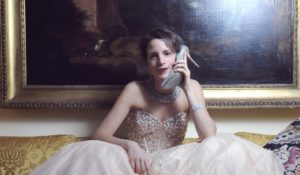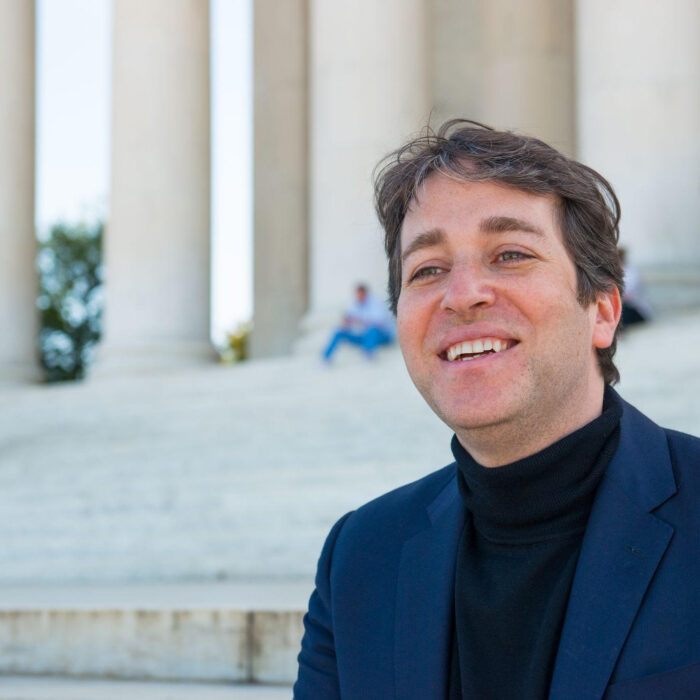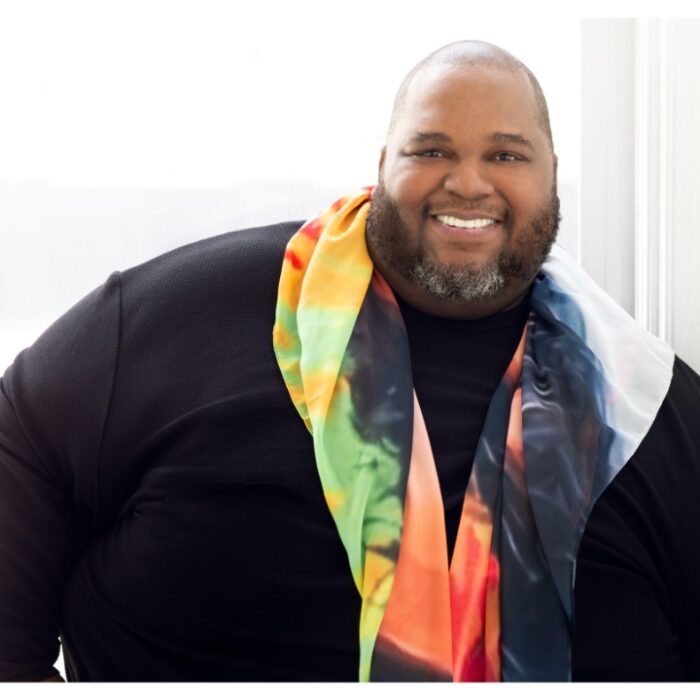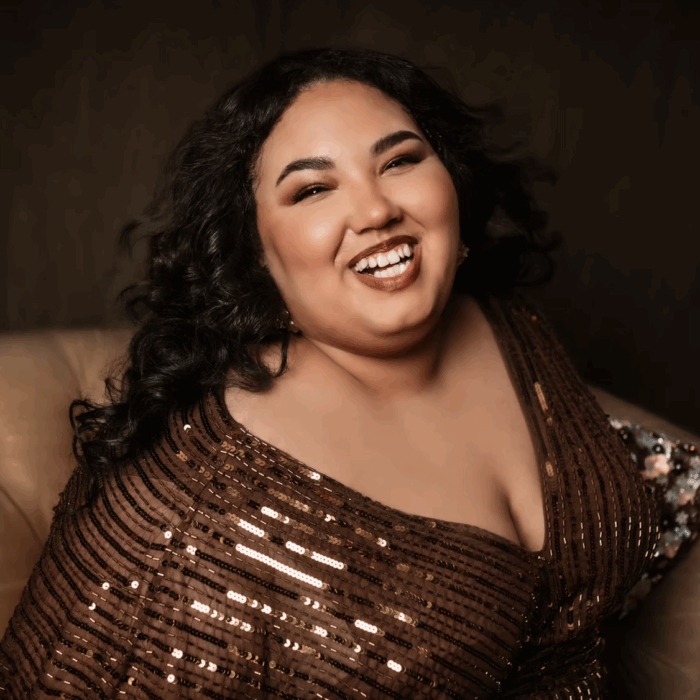
Q & A: Mezzo-Soprano Arlene Belli Provides a Young Singer’s Perspective on Establishing a Career Under Lockdown
By Alan Neilson(Photo: Riccardo Scrocca)
The coronavirus has had a huge impact on theaters and live performances, and opera has certainly not been immune from its consequences.
With the theatres closed, singers, directors and musicians, set and costume designers and conductors, to name but a few, have all seen their work come to an abrupt halt. For the stars, this may be frustrating at worst, and a useful break at best, but what about those at the other extreme – young singers who are just starting out on their career who see the opportunities for important formative experiences dry up?
OperaWire managed to talk to one such singer, mezzo-soprano Arlene Miatto Albeldas, (stage name Arlene Belli) who recently qualified from the Conservatory in Rome, successfully carving out her career. Last September she appeared in the substantial role of Dorina in Galuppi’s “La Diavolessa” at the Vicenza in Lirica festival, in which she was praised in these pages for the attention she gave to the “text and its articulation, emphasis, and intonation” in a performance which was a “multi-layered portrayal which had real depth.”
In what was a wide-ranging conversation, Belli talked about the effect the Coronavirus has had on her career, the Vicenza in Lirica festival, her ambitions, her teachers and her musical experiences to date.
OperaWire: What made you want to become an opera singer?
Arlene Belli: Music has always been part of my life. I come from a musical family, although not one which included opera. My grandfather, on my mother’s side, was a natural musician, he could play any instrument without ever learning how to play it; you just had to give him it and he would play. I like to think he inspired me to become a singer: when I was still a baby the family was in a restaurant in Rome and I started to sing and he wished that I one day would become a professional singer. I see it as a gift he gave me.
My father was also an inspiration in my decision to become a singer: he was a rock singer and loves music, including opera. I am happy to say that he is now my biggest fan.
My first realization that I wanted to follow a musical career came when as a child I used to follow a black cat called Billy, who led me into this abandoned house, in which there was an old piano. I used to play it and sing along. It was out of tune, but I loved it and music has strayed with me ever since.
However, it was hearing Maria Callas that really put me on the road towards a career as an opera singer. Her voice kept threading itself through my life. I remember hearing the sound of a singer from an apartment when coming home from my abandoned house. I had no idea who it was or what was being sung, but it was amazing. Years later, when I was in Rome, my father bought a CD of Maria Callas, and we played it in the car on the journey back to Padua. I recognized the voice immediately: it was Callas again, singing the same piece “Una poco voce fa.” I listened to it over and over again. From then on I knew I wanted to be a singer.
Things progressed from there. My mother encouraged me to join a local singing school in Padua, and I really didn’t want to go, but when I got there I loved it.
OW: Who has been the most important influence on your development as singer?
AB: My teacher, the mezzo-soprano Manuela Custer. She has been so important to me. She is an excellent teacher, she gives me all she can. She holds nothing back, she is very open. If she doesn’t tell you something it is just because at that point she feels that you are not ready for it. But she doesn’t keep secrets and is really enthusiastic about helping me develop. I have learned so much from her!
Then, there is also Cristina Melis, another mezzo. She is a dramatic mezzo with a huge voice. Because Manuela is very busy and travels so much, she is not always available, so I need someone else to check on me occasionally. Cristina gave me some excellent advice, which also helped me a lot.
OW: I notice that you have taken part in a number of competitions, and have met with success. You won the International Simone Alaimo Competition for example. In what ways have competitions been helpful in developing your career?
AB: I like them because they test you. Competitions put you in a terrible position; there are no scenes, no costumes, you are on your own, just you and your voice. You are totally exposed. You have a maximum of ten minutes to show the judges and the audience what you can do. It is a lot of pressure.
But I know I have to do them. They are a good learning experience, they teach you how to control your nerves, they challenge you and enable you to see what you can do, they help develop your confidence and of course, they are an excellent showcase, they get you known, and this is very important. So they can open up opportunities.
OW: You are only at the beginning of your singing career, to what extent has the lockdown affected your development? Has it held you back at all? Have there been any positives?
AB: Just prior to the lockdown I had a lot of auditions and they all went well. I managed to gain a place at The National Opera Studio in London, and I shall be starting in September, which is great. I actually thought I had done badly, I had a sore throat at the time, but it all worked out, and now I have a great opportunity and am very positive about the future.
So the lockdown has given me the space that I needed, a time for reflection, to sort out a few things while preparing for my new life in London in September. I am lucky because I have my next stage already planned. I can’t do anything at the moment and so I don’t feel guilty about taking it easy. Other singers have had performances canceled and they have a huge gap! So I have been fortunate.
Also, the lockdown has let me get to know my neighbors. I sang from my window in the evening over the piazza. My neighbors love it; they asked me to sing from the back of the apartment as well. It was a beautiful experience.
It also allowed me to work on my social media profile. It is not something I ever considered doing before, but now I realize that many good things can come from it if used properly. I have received texts from as far away as South America saying how much they have appreciated my performances. It is a joy to know that I have brought something to other people, and now it has become a daily appointment. It is very gratifying.
It is amazing how quickly time moves on, so now I have to start studying again, prepare for my move to London, and hopefully find an agent who will make my life a lot easier.
OW: Last September you performed the role of Dorina in Galuppi’s “La Diavolessa” at the “Vicenza In Lirica” festival. This was a big role. What were its challenges, and what are your impressions of the festival?
AB: The part was written for a contralto and I am a mezzo. I am at my most comfortable with Charlotte from “Werther.” So it was certainly a challenging role and presented a number of difficulties from the singing point of view, but ones that I enjoyed and from which I learned so much.
The character was also very different from me. Generally, I like and feel more comfortable with dramatic roles, but this was a comedy role. I put a lot of work into it and must admit I enjoyed it because I like to make people laugh, and realized it is something I can do well.
The opportunities you receive from performing such a role in such an environment, in a festival with a growing reputation is fantastic. You work with a group of young singers under the guidance of Maestro Erle and the director Bepi Morassi, who bring with them so much knowledge and experience, you cannot fail to benefit from the experience. The festival gives opportunities to young singers in big roles, and there are not many such opportunities in Italy.
Nevertheless, it is high-pressured and expectations are high. You only have ten days to practice it, so you must arrive on the first day of rehearsals completely prepared. “La Diavolessa” is a very long piece, it lasts 3 hours 45 minutes, and was a challenge putting it all together in such a short space of time, but what a wonderful experience!
I learned a lot, and it helped me realize what strengths I have; generally, while working I tend to focus on my weaknesses. It was only when everything was over that I realized what I had actually achieved.
Also the Teatro Olimpico is an incredible venue. If you think of all the great people who have sung there, and its great history, you ask yourself, “Can I do this?” It is fantastic.
I was so grateful to have had such an opportunity.
OW: How would you describe your voice?
AB: You can be given a tag, like a mezzo, but I am not fond of that. I see my voice as a representation of myself. I am my voice and vice-versa. It transmits my emotions exactly the way I feel them. Probably people get this when they hear me sing. The compliments I receive from people tend to be on how my interpretations touch them.
OW: Do you prefer opera or concert recitals?
AB: Opera, absolutely! I love dressing up and being someone else, playing a character. It allows me to do things I am not allowed to do in my real life. I change within myself: some days, for example, I wake up and feel more masculine, other days more feminine, and opera allows me to act out these aspects of my nature.
OW: What are your ambitions for the near future?
AB: Personally I want to improve as a singer, this is very important to me because I want to become a positive inspiration to the people around me. I am Buddhist and it is important that whatever I do brings happiness and good to the world.
In five years’ time, I would like to say I have sung in places such as Martina Franca and, of course, La Scala, and not just because it is so prestigious. I want to experience so much, small theatres, big theatres, music-making with ensembles, with big orchestras, and travel to many countries, so that I can grow musically.
It goes back to my philosophy of life: in order to connect with the audience you must be immersed within the sound, and sounds are something very profound. To understand and uncover the meaning of a piece of music takes time and involves the whole person. It is not simply getting the sound right, you must know yourself, therefore I must understand and gain a deeper knowledge of myself, based on experience. Then I must adapt my technique to my changing understanding of myself and of the roles I am playing. For me to arrive at such a position means I need to reach a high level as a singer.
I have one secret wish: one day I would love to collaborate with musicians from other fields, such as Jacob Collier, outside the field of classical music, and use my voice to create something new.



